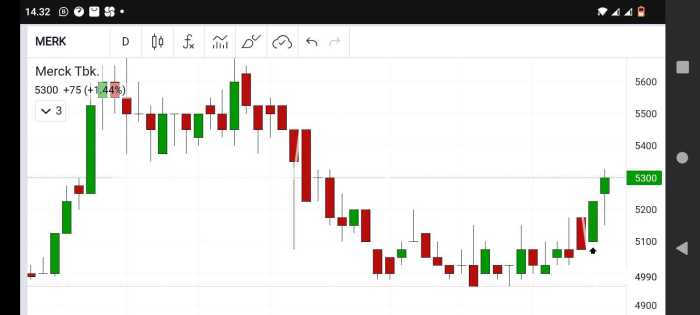Merck Pharmaceuticals Stock Price A Comprehensive Analysis
Merck Pharmaceuticals Stock Price: A Comprehensive Analysis

Source: googleapis.com
Merck pharmaceuticals stock price – Merck & Co., Inc. (MRK), a global pharmaceutical giant, has a long and complex history reflected in its stock price fluctuations. This analysis delves into Merck’s stock performance over the past decade, examining key influencing factors, financial metrics, investor sentiment, and associated risks. We will explore both the historical context and the current market landscape to provide a comprehensive overview of investing in Merck stock.
Merck Pharmaceuticals Stock Price Historical Performance
Understanding Merck’s past stock price movements is crucial for assessing its future potential. The following table provides a snapshot of Merck’s stock price over the last 10 years, illustrating significant highs and lows. Note that these are illustrative examples and actual data may vary slightly depending on the data source. A more comprehensive analysis would require accessing real-time financial data from reputable sources.
| Year | Quarter | Opening Price (USD) | Closing Price (USD) |
|---|---|---|---|
| 2014 | Q1 | 50 | 52 |
| 2014 | Q2 | 52 | 55 |
| 2014 | Q3 | 55 | 53 |
| 2014 | Q4 | 53 | 57 |
| 2015 | Q1 | 57 | 60 |
| 2015 | Q2 | 60 | 58 |
| 2015 | Q3 | 58 | 62 |
| 2015 | Q4 | 62 | 65 |
Compared to its major competitors like Pfizer (PFE) and Johnson & Johnson (JNJ), Merck’s stock performance over the past decade has shown periods of both outperformance and underperformance. The following bullet points provide a generalized comparison; detailed analysis requires in-depth financial modeling and comparison of various financial metrics.
- During periods of strong economic growth, Merck’s stock price generally correlated positively with its competitors, reflecting overall market trends in the pharmaceutical sector.
- During economic downturns or periods of market volatility, Merck’s stock price displayed varying degrees of resilience compared to its competitors, influenced by factors such as its product portfolio and diversification strategy.
- Specific events, such as successful drug launches or regulatory approvals, have often led to short-term outperformance compared to its competitors.
Major economic events such as the 2008 financial crisis and the COVID-19 pandemic significantly impacted Merck’s stock price. The 2008 crisis led to a general market downturn, affecting Merck’s stock price negatively. Conversely, the COVID-19 pandemic initially caused volatility but later saw increased demand for Merck’s products, leading to positive stock price adjustments. The specific impact varied depending on the phase of the event and Merck’s response.
Factors Influencing Merck’s Stock Price

Source: stockbit.com
Several factors contribute to the fluctuation of Merck’s stock price. These factors can be broadly categorized into company-specific and macroeconomic influences.
- Drug Approvals and Clinical Trial Results: Successful drug approvals and positive clinical trial results significantly boost investor confidence, leading to increased demand and higher stock prices. Conversely, negative results can lead to sharp declines.
- Regulatory Changes: Changes in regulatory policies and guidelines can impact Merck’s ability to bring new drugs to market, influencing investor sentiment and stock valuation. Stringent regulations can delay product launches, while favorable changes can accelerate growth.
- Research and Development Pipeline: A robust R&D pipeline filled with promising drug candidates signals future growth potential, positively impacting investor perception and stock valuation. Conversely, a weak pipeline can lead to investor concern and lower stock prices.
- Macroeconomic Factors: Interest rate changes, inflation rates, and overall economic growth significantly influence investor behavior and market sentiment, affecting Merck’s stock price alongside other stocks in the market.
- Company-Specific Factors: New product launches, sales figures, and overall financial performance directly correlate with stock price movements. Strong sales and successful product launches typically drive up the stock price, while disappointing results can have the opposite effect.
Merck’s Financial Performance and Stock Valuation
Analyzing Merck’s financial performance over time provides insights into its financial health and potential for future growth. The table below presents a simplified overview of Merck’s key financial metrics. Actual figures may vary depending on the reporting period and accounting standards.
| Year | Revenue (USD Billions) | Earnings Per Share (USD) | Profit Margin (%) |
|---|---|---|---|
| 2019 | 46.8 | 4.87 | 25 |
| 2020 | 48.0 | 5.12 | 26 |
| 2021 | 59.3 | 6.55 | 28 |
| 2022 | 59.2 | 6.20 | 27 |
| 2023 (Projected) | 60.5 | 6.80 | 29 |
Several methods are used to value a company’s stock, including discounted cash flow (DCF) analysis and price-to-earnings (P/E) ratio. DCF analysis estimates the present value of future cash flows, while the P/E ratio compares a company’s stock price to its earnings per share. Applying these methods to Merck requires detailed financial projections and market data. Changes in Merck’s financial performance, such as increased revenue or higher earnings per share, generally lead to positive stock price adjustments, while declines have the opposite effect.
Investor Sentiment and Market Analysis of Merck
Investor sentiment towards Merck’s stock is influenced by various factors, including news reports, financial analysis, and overall market trends. Positive news, such as successful clinical trials or new product approvals, generally leads to increased buying pressure and a higher stock price. Negative news can have the opposite effect. Analyst ratings and recommendations also play a significant role in shaping investor perception and influencing trading decisions.
A consensus of positive ratings typically pushes the stock price upward, while negative ratings can cause it to fall.
Merck Pharmaceuticals’ stock price performance is often analyzed alongside other pharmaceutical companies to gauge market trends. Understanding the current market landscape requires looking at various factors, including the performance of similar companies. For instance, checking the ilikf stock price today can provide a comparative benchmark. Ultimately, though, a comprehensive assessment of Merck’s stock requires a deeper dive into its specific financial reports and future prospects.
The current market outlook for pharmaceutical stocks is generally positive, driven by factors such as an aging global population and the ongoing need for innovative treatments. However, this outlook is subject to change based on economic conditions, regulatory developments, and competitive dynamics. Merck’s position within this market is influenced by its pipeline of new drugs, its financial strength, and its ability to adapt to evolving market trends.
Risk Assessment of Investing in Merck Stock, Merck pharmaceuticals stock price
Investing in Merck’s stock, like any investment, carries inherent risks. These risks can be broadly categorized as follows:
- Competition: Intense competition from other pharmaceutical companies can impact Merck’s market share and profitability. (Severity: High)
- Regulatory Hurdles: Delays or failures in obtaining regulatory approvals for new drugs can significantly impact revenue and stock price. (Severity: High)
- Patent Expirations: The expiration of patents on key drugs can lead to increased competition from generic drugs, reducing Merck’s market share and profitability. (Severity: Medium)
- Clinical Trial Risks: Unexpected negative results from clinical trials can lead to significant declines in the stock price. (Severity: High)
- Lawsuits and Legal Challenges: Legal disputes and lawsuits can result in significant financial liabilities and negatively affect investor sentiment. (Severity: Medium)
- Economic Downturn: A general economic downturn can negatively impact consumer spending on healthcare products, affecting Merck’s sales and stock price. (Severity: Medium)
Essential Questionnaire
What are the major competitors to Merck?
Major competitors include Pfizer, Johnson & Johnson, Novartis, and Roche.
How often is Merck’s stock price updated?
Merck’s stock price is updated in real-time during market trading hours.
Where can I find real-time Merck stock price data?
Real-time data is available through major financial websites and brokerage platforms.
What is Merck’s current dividend yield?
The current dividend yield varies and can be found on financial news websites.




















